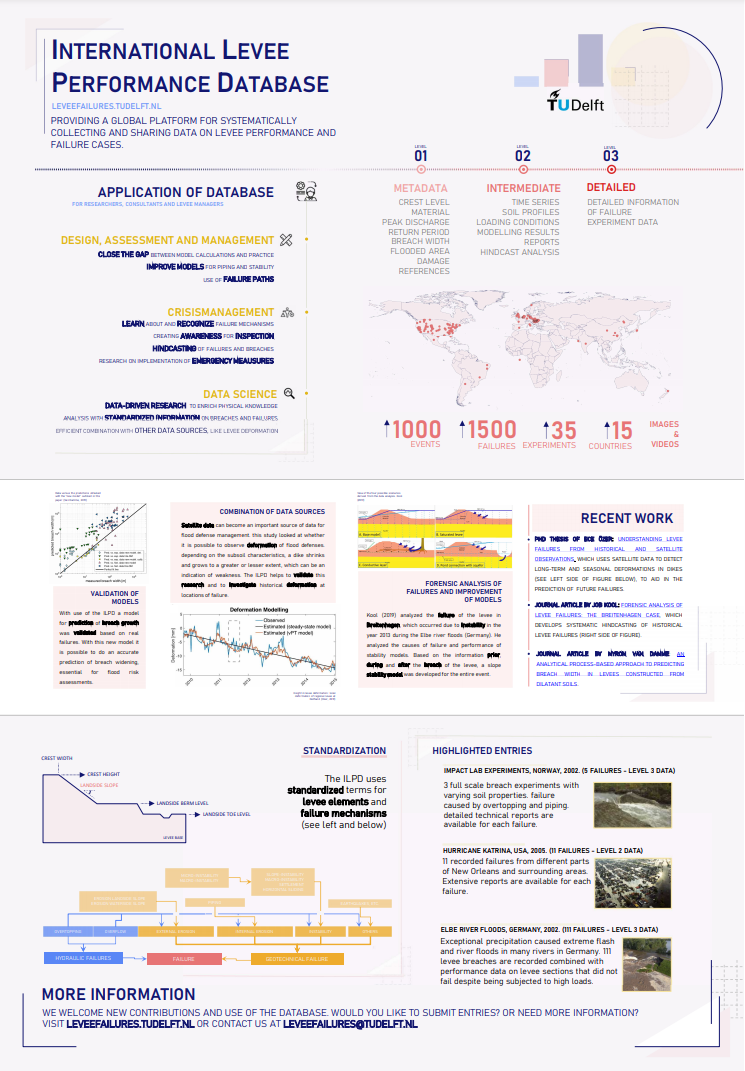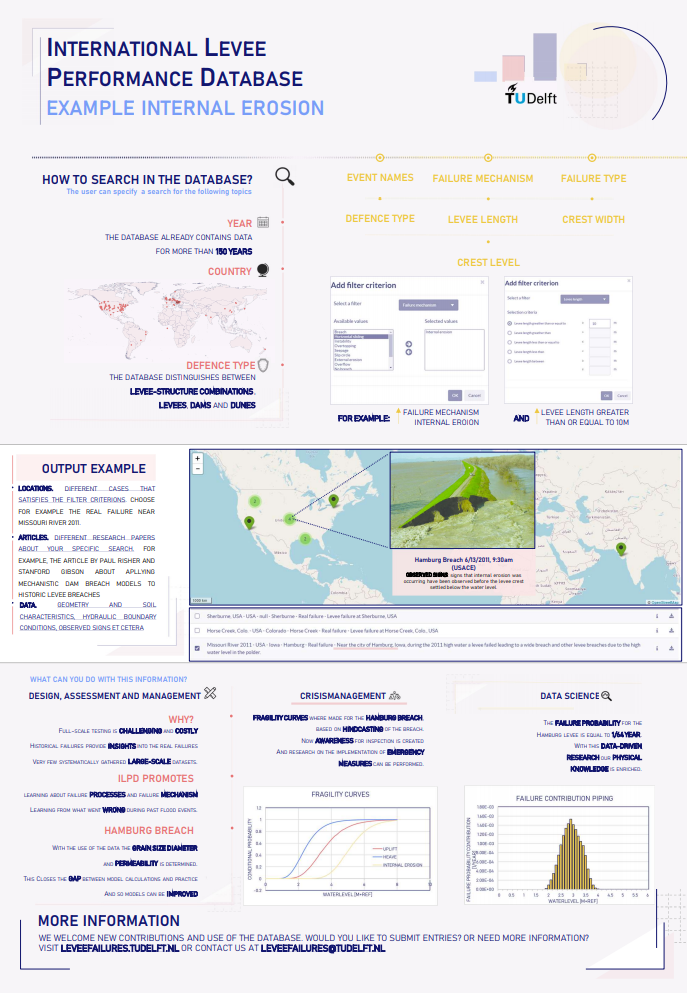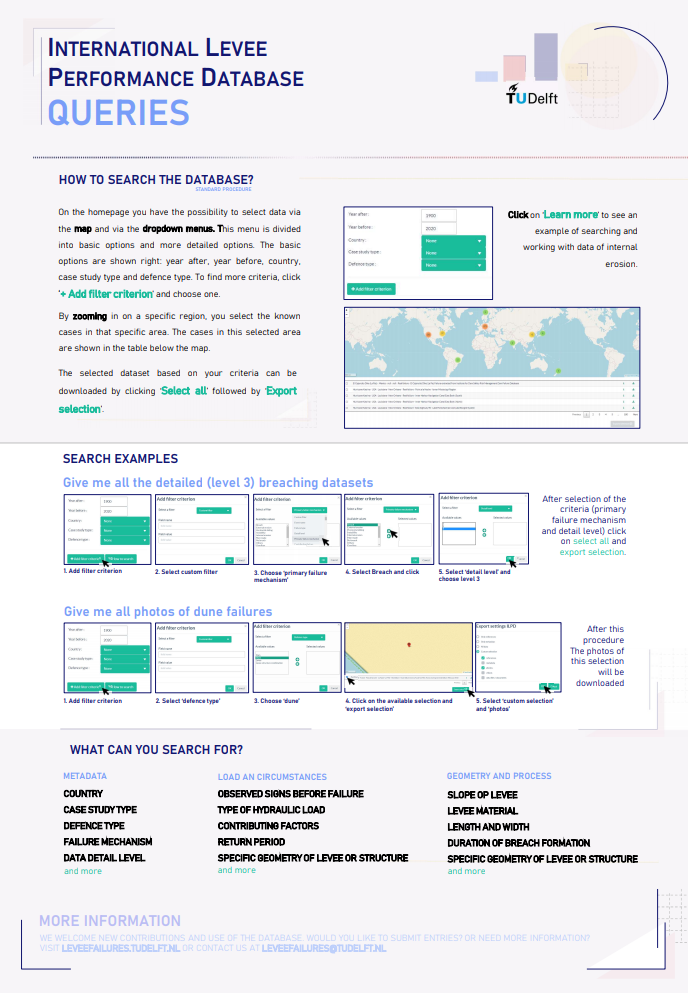A Flows production showcasing the ILPD
watch our video and read the article on:
leveeperformance.flowsproductions.nl
Factsheet ILPD
 Learn more about the ILPD with this factsheet about the content and use of this the database
Learn more about the ILPD with this factsheet about the content and use of this the database
Factsheet queries
Factsheet example piping
 Learn more about an example of using the ILPD for internal erosion.
Learn more about an example of using the ILPD for internal erosion.
International Levee Performance Database
Failures of flood defenses cause major catastrophes in terms of loss of life and economic damage. By learning from these disasters we can contribute to the prevention of these catastrophic events in the future. With the ILPD database (at leveefailures.tudelft.nl) levee managers and experts can improve their knowledge about levee failures and breaches of flood defense systems. The ILPD is the database for systematic analyses, in which we standardize levee failure information for combining and comparing events and failures around the world. It contains general information of individual failures, detailed investigations on soil and breaching characteristics and small and large-scale experiments. You can use it to advance failure models, improve dike design and increase your knowledge for crisis management. A large database is available for you to do research and field studies in collaboration with academia, governmental organizations and private companies. Want to know more? Or would like to contribute? Visit the ILPD at leveefailures.tudelft.nl Or Watch other video’s on the International Levee Performance Database.
Assessments and Design
By definition, models deviate from reality. This is due to uncertainty With the ILPD you gain insight into the actual failure of levee and you can improve models with practical information about dike breaches, dike failure and performance. You will have access to comparative research for numerical models and lab experiments. You have an overview of locations with specific problems and you are able to validate technical information with reality. You have insight into more than 1500 examples of levee breaches and behavior under heavy loads. Standardized information about geometry, subsoil, loads, failure mechanisms and dike breaches provide additional insight into the collapse of dikes. In addition to lab tests, field experiments and numerical modeling research, the experiences of real breaches are an important source of knowledge. For example, we gained insight into the cause of failure and the performance of various Dutch models for macro-stability based on a German dike breach. This information helps to improve the quality of assessments and designs and to validate experiments. Do you want to know more? Or would you like to contribute? Visit our website or watch other videos about the International Levee Performance Database.
Crisis management
How do you prepare the response to impending floods and potential dike breaches and what can we learn from dike performance during real floods? Fortunately, real dike breaches do not occur frequently. However, by learning from international experience of real and near failures, dike managers can get more insight in to what happens during extreme conditions. The ILPD contains historical breaches, experiments and data on the performance of levees that did and did not fail during high water events. With real cases, we show dike inspectors what happens in practice and what they should be aware off. A crisis manager can use hindcasting techniques to better identify potential future failures, and can investigate the implementation of effective emergency measures. The ILPD’s data structure allows for levee performance data to be searched in relation to an overall flood event, providing comparative data at both local, regional and catchment scale, or in relation to a particular failure mechanism. With the use of standardized information you gain knowledge on typical sizes of real breaches, the type of failure, the time period of breaching and, the circumstances of how failure initiates and develops in time. Want to know more or would like to contribute to the database? Visit our website or watch our other videos on the International Levee Performance Database.
Data science
How does the ILPD offer opportunities for the application of new analysis techniques in the future? With the ILPD you get the freedom to do data-driven research on the performance of levees, their failures and resulting consequences. For studies into flood defences we often use physical knowledge for these complex problems. The ILPD standardization and combinations of breaches and failure makes it possible to enrich your physical knowledge with insights gained through data science. You get to know the type of failure mechanisms which occur most frequently, which levees are most vulnerable, and you can investigate the relationship between the size of a breach and the failure mechanism. The database can be combined with other observations from satellites on levee deformation, archived information and expert judgment. The ILPD gives the opportunity to learn from past flood events and failure processes. In this way we can contribute to the prevention of catastrophic events in the future. Want to know more or would like to contribute to the database? Visit our website or watch our other videos on the International Levee Performance Database.

